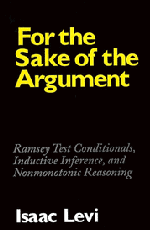 For the Sake of the Argument
For the Sake of the Argument Book contents
- Frontmatter
- Contents
- Preface
- For the Sake of the Argument
- 1 Introduction
- 2 Unextended Ramsey Tests
- 3 Modality without Modal Ontology
- 4 Aspects of Conditional Logic
- 5 Nonmonotonicity in Belief Change and Suppositional Reasoning
- 6 Inductive Expansion
- 7 Defaults
- 8 Matters of Degree
- 9 Normality and Expectation
- 10 Agents and Automata
- Notes
- Bibliography
- Name Index
- Subject Index
3 - Modality without Modal Ontology
Published online by Cambridge University Press: 04 May 2010
- Frontmatter
- Contents
- Preface
- For the Sake of the Argument
- 1 Introduction
- 2 Unextended Ramsey Tests
- 3 Modality without Modal Ontology
- 4 Aspects of Conditional Logic
- 5 Nonmonotonicity in Belief Change and Suppositional Reasoning
- 6 Inductive Expansion
- 7 Defaults
- 8 Matters of Degree
- 9 Normality and Expectation
- 10 Agents and Automata
- Notes
- Bibliography
- Name Index
- Subject Index
Summary
Truth, Information, and Full Belief
When an inquirer seeks to improve his current state of full belief, the legitimacy of the alteration made depends on the aims of the inquirer. There are many kinds of aims inquirers might and do have in altering their full beliefs. These aims need not be economic, political, moral, or aesthetic. Cognitive aims may be pursued as well. The kind of cognitive aim that, in my opinion, does best in rationalizing scientific practice is one that seeks, on the one hand, to avoid error and, on the other, to obtain valuable information. Whether inquirers always seek error-free information or not need not concern us here. I rest content for the present with making the claim that agents can coherently pursue cognitive aims of this kind.
A consequence of this view is that states of full belief should be classifiable as error free or erroneous. Otherwise it makes little sense for an inquirer to seek to avoid error in changing his or her state of full belief. Likewise states of full belief should be classifiable as stronger or weaker; for those who seek valuable information should never prefer weaker states of full belief to stronger ones.
The two classifications are interrelated. If state 1 is stronger than state 2 and is error free, so is state 2. If state 2 is erroneous, so is state 1.
- Type
- Chapter
- Information
- For the Sake of the ArgumentRamsey Test Conditionals, Inductive Inference and Nonmonotonic Reasoning, pp. 51 - 83Publisher: Cambridge University PressPrint publication year: 1996
